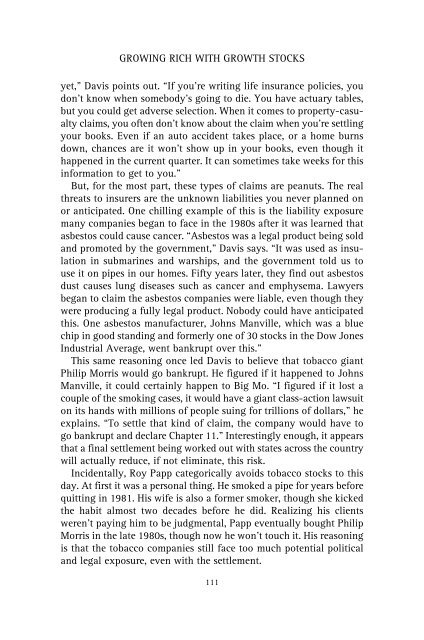You also want an ePaper? Increase the reach of your titles
YUMPU automatically turns print PDFs into web optimized ePapers that Google loves.
GROWING RICH WITH GROWTH STOCKS<br />
yet,” Davis points out. “If you’re writing life insurance policies, you<br />
don’t know when somebody’s going to die. You have actuary tables,<br />
but you could get adverse selection. When it <strong>com</strong>es to property-casualty<br />
claims, you often don’t know about the claim when you’re settling<br />
your books. Even if an auto accident takes place, or a home burns<br />
down, chances are it won’t show up in your books, even though it<br />
happened in the current quarter. It can sometimes take weeks for this<br />
information to get to you.”<br />
But, for the most part, these types of claims are peanuts. The real<br />
threats to insurers are the unknown liabilities you never planned on<br />
or anticipated. One chilling example of this is the liability exposure<br />
many <strong>com</strong>panies began to face in the 1980s after it was learned that<br />
asbestos could cause cancer. “Asbestos was a legal product being sold<br />
and promoted by the government,” Davis says. “It was used as insulation<br />
in submarines and warships, and the government told us to<br />
use it on pipes in our homes. Fifty years later, they find out asbestos<br />
dust causes lung diseases such as cancer and emphysema. Lawyers<br />
began to claim the asbestos <strong>com</strong>panies were liable, even though they<br />
were producing a fully legal product. Nobody could have anticipated<br />
this. One asbestos manufacturer, Johns Manville, which was a blue<br />
chip in good standing and formerly one of 30 stocks in the Dow Jones<br />
Industrial Average, went bankrupt over this.”<br />
This same reasoning once led Davis to believe that tobacco giant<br />
Philip Morris would go bankrupt. He figured if it happened to Johns<br />
Manville, it could certainly happen to Big Mo. “I figured if it lost a<br />
couple of the smoking cases, it would have a giant class-action lawsuit<br />
on its hands with millions of people suing for trillions of dollars,” he<br />
explains. “To settle that kind of claim, the <strong>com</strong>pany would have to<br />
go bankrupt and declare Chapter 11.” Interestingly enough, it appears<br />
that a final settlement being worked out with states across the country<br />
will actually reduce, if not eliminate, this risk.<br />
Incidentally, Roy Papp categorically avoids tobacco stocks to this<br />
day. At first it was a personal thing. He smoked a pipe for years before<br />
quitting in 1981. His wife is also a former smoker, though she kicked<br />
the habit almost two decades before he did. Realizing his clients<br />
weren’t paying him to be judgmental, Papp eventually bought Philip<br />
Morris in the late 1980s, though now he won’t touch it. His reasoning<br />
is that the tobacco <strong>com</strong>panies still face too much potential political<br />
and legal exposure, even with the settlement.<br />
111










